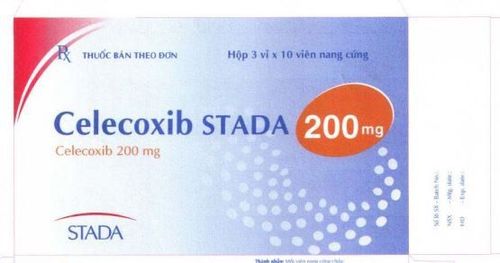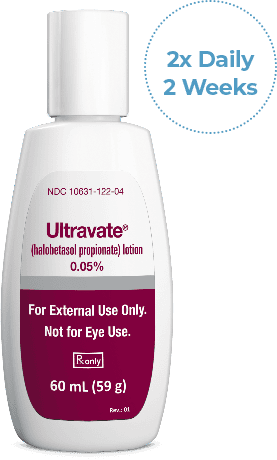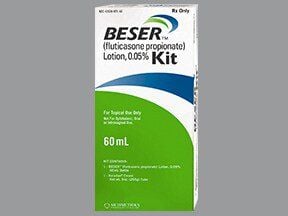This is an automatically translated article.
The article was written by Pharmacist Cao Thanh Tu - Faculty of Pharmacy - Vinmec Times City International General Hospital.
Celecoxib can interact with many different drugs, leading to an increase or decrease in the effects and unwanted effects of either drug or both drugs at the same time. Therefore, it is important to inform your doctor about any medications or supplements you are taking before starting to take celecoxib.
1. What is Vicoxib 200mg?
The main ingredient of Vicoxib 200mg is Celecoxib. The drug blocks an enzyme in the body called cyclooxygenase-2 (COX-2). This enzyme is involved in the production of compounds that cause inflammation and pain in the body. Because celecoxib blocks the action of the enzyme cyclooxygenase 2, it reduces pain and inflammation.2. Indications/Contraindications to Vicoxib 200mg
Vicoxib is indicated in the following cases:
Reduce symptoms of osteoarthritis, rheumatoid arthritis, ankylosing spondylitis. Treatment of acute pain, including pain after surgery, tooth extraction. Treatment of primary dysmenorrhea. Do not use Vicoxib in the following cases:
Hypersensitivity to any component of the drug or to sulphonamides. Severe heart failure. Severe kidney failure. Severe liver failure. Inflammatory bowel disease (Crohn's disease, ulcerative colitis). Stomach ulcer or gastrointestinal bleeding. Treatment of pain in artificial coronary artery bypass graft surgery. Patients with asthma, acute rhinitis, nasal polyps, angioedema, urticaria or other types of allergic-type reactions after taking aspirin or other nonsteroidal anti-inflammatory drugs including cyclo-oxygenase inhibitors 2 (COX-2).

Người mắc viêm mũi cấp tính không nên sử dụng thuốc Vicoxib 200mg
To date, there are no adequate studies with celecoxib in pregnant women. Celecoxib should be used during pregnancy only when the potential benefit outweighs the possible risk to the fetus. Do not use celecoxib in the last 3 months of pregnancy.
Small amounts of the drug may pass into breast milk when a nursing mother takes Vicoxib. Because of the potential adverse effects of the drug on the nursing infant, depending on the desired benefit of the drug to the mother, consideration should be given to discontinuing the drug or stopping breastfeeding.
3. Dosage - How to take Vicoxib 200mg
Always take the medicine as prescribed by your doctor, the usual recommended dose of Vicoxib is:
Osteoarthritis in adults: 200mg/day orally once or divided into 2 equal doses. Rheumatoid arthritis in adults: Oral 100-200 mg/time, twice a day Ankylosing spondylitis: 200mg/day orally once or divided into 2 equal doses. Some patients may need 400 mg/day Acute pain and dysmenorrhea: Take the first dose of 400 mg, an additional 200 mg dose on the first day if necessary. In the following days, take 200 mg twice a day as needed. Elderly with body weight less than 50 kg, the lowest recommended dose must be used at the start of treatment.
4. Drugs that can interact with celecoxib should be noted
Drugs that are less effective when taken with celecoxib: some antihypertensive drugs, diuretics. Concomitant use of celecoxib with these drugs may also increase the risk of renal side effects of celecoxib May increase side effects of celecoxib if taken with: fluconazole

Người bệnh không nên tự ý kết hợp Vicoxib với các loại thuốc khác
5. Side effects of Vicoxib 200mg
When used in usual doses and short-term, the drug causes few side effects.
One of the common undesirable effects of Vicoxib is the effects related to the gastrointestinal tract such as vomiting, abdominal pain, diarrhea, indigestion, bloating. If you experience these symptoms, take the drug after meals. The drug can cause ulcers and stomach bleeding. The risk is greater if the drug is taken in high doses and for a long time.
To reduce the risk of this side effect, limit alcohol use while taking the medication, taking the lowest dose for the shortest time possible. Vicoxib should not be taken with steroid drugs (such as prednisolone) or anticoagulants (such as warfarin, Pradaxa, or Xarelto).
Medicines can increase blood pressure. If you already have high blood pressure, your blood pressure should be checked regularly, and you may need to stop if your blood pressure gets too high. It can also cause salt and water retention, especially in the ankles.
Other common side effects of the drug are: rash, rash, cough, dizziness, insomnia, sore throat, rhinitis, sinusitis, urinary tract infection.
Please dial HOTLINE for more information or register for an appointment HERE. Download MyVinmec app to make appointments faster and to manage your bookings easily.













